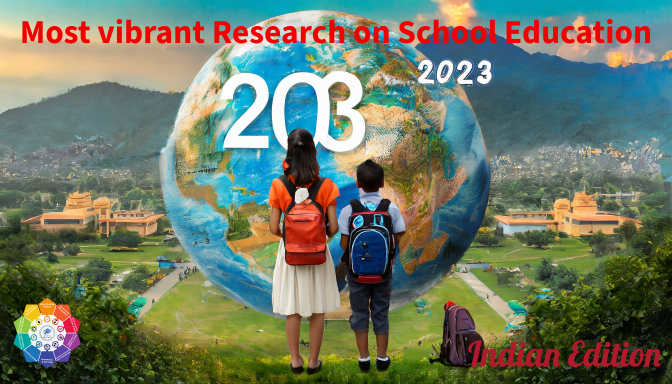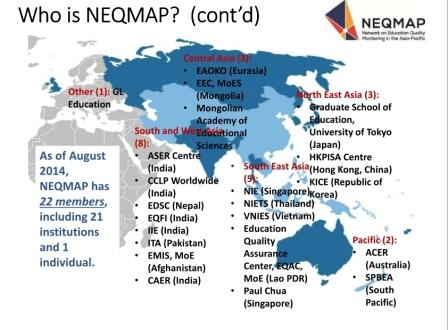CCLP Worldwide is an institutional member of UNESCO Network on Education Quality Monitoring in the Asia-Pacific.

CCLP WORLDWIDE HAS BEEN FORMALLY ADMITTED AS INSTITUTIONAL MEMBER OF UNESCO NEQMAP VIDE CONFIRMATION MADE VIDE LETTER DATED 4TH FEBRUARY 2014.
Main Purpose of NEQMAP
With more children enrolled in school, the issues of quality and equity, together with the subsequent question of whether and how well students are learning have become increasingly pertinent, with several global and regional initiatives focussing on this issue.
Countries are looking to improve the way education systems evaluate the performance of students in an effort to closely monitor how well students are learning.
At the same time, policymakers, researchers and practitioners are concerned with the suitability of assessment systems, to ensure that they meet the needs of learners. In some cases, this includes concerns that excessive testing may cause education provision to be skewed
towards undesirable side effects including “teaching to the test”.
Monitoring of learning outcomes can facilitate changes to the education system to improve learning and is also important for accountability and for governments to justify investments in education.
Comprehensive monitoring of learning requires effective and contextualised policies, structures, practices and tools in order to produce a valid and reliable evidence base for improving the quality of learning.
In considering assessment as the key tool used in monitoring learning, it is also critical to maintain strong linkages with curriculum and pedagogy as the main enablers of learning in the classroom.
Countries/jurisdictions of the Asia-Pacific region, with diverse experiences from a wide range of perspectives, have tremendous potential to learn from each other and synergize efforts in improving the way learning is monitored and in using assessments to improve learning across the region.
Countries have been showing increasing interest in sharing of experiences and expertise, and also the desire to learn from others in issues related to assessment, including the use of assessment data to improve policy and learning.
Recognizing this demand, UNESCO’s Asia-Pacific Regional Bureau for Education (UNESCO Bangkok), has the mandate to facilitate a regional platform for networking and information exchange on monitoring learning to raise the quality of education in the Member States. This regional platform, the Network on Education Quality Monitoring in the Asia-Pacific
(NEQMAP), is hereby established on 28 March 2013, in Bangkok, Thailand.





Dear President, Chief Secretariat and all well-meaning educators,
The Academic Council – CCLP Worldwide has vehemently advocated for an inclusive and equitable education system that respects, protects and fulfills the aspirarations of interested learners at various levels. It is not by accident that CCLP Worldwide is an Institutional Member of UNESCO- NEQMAP with its main focus on ASSESSMENT in learning by learners. I appeal to educators of all shades to appreciate United Nations Sustainable Development Goal number 4 which focuses on an inclusive, equitable and quality education promotion by all educational institutions and actors worldwide. It is important to promote and sustain holistic education system which appreciates the notion of “Recognition, Validation and Accreditation” of ALL forms of learning. Today, we should all value and vehemently promote the notion of lifelong and life-wide learning in different contexts and circumstances. All educators should promote the equal value of learning outcomes of formal, non-formal and informal learning. Competences that every individual has accumulated through non-formal and informal learning should be treated on a par with those that are obtained through formal learning; ensuring the centrality of learners in the recognition, validation and accreditation process is critical; education systems worldwide should respect and reflect individual needs and aspirations; and educational institutions and educators should appreciate and follow through to the latter, the notion of flexibility and openness in formal education and training processes. Importantly, I should firmly assert and re-echo that our education and training systems today should consider diverse forms of learning, taking into account learners’ needs and experiences as a matter of right to be respected, protected and fulfilled. It is imperative that the criteria and procedures for assessing and validating non-formal and informal learning should be: relevant, reliable, fair and transparent. Therefore, to enable this new approach to education systems in assessment to be changed or modified accordingly, and to enable current education stakeholders or actors to be in tandem with UNSDG number 4, it is vital that the international community sponsored by UNESCO and UNAI Memberships should be on the forefront in the promotion and strengthening of appropriate educational partnerships among stakeholders and actors worldwide. Promoting the culture of sharing experiences with education ministries, education accreditation bodies, quality assurance bodies and other relevant education actors should then become crucial in the exercise of capacity building, networking and engagements, and as frequently as possible. We need this united front of actions if success stories are to come by. Successful implementation of UNSDG number 4 by 2030 will not come by on a silver plate, but rather through sustained, well programmed and concerted efforts by different educational stakeholders and actors, coordinated by UNESCO agents and offices around the world. Thank you. Prof Dr Christopher Oyat, Fellow Chartered Educator, Academic Council CCLP Worldwide